Key takeaways
- Studio time is essential for focused creativity, transforming ideas into sound while respecting the creative process.
- Choosing the right studio involves assessing emotional comfort and logistical support, beyond just equipment.
- Effective preparation, including organizing files and clearly communicating your vision, enhances collaboration and workflow.
- Maximizing studio productivity requires setting clear goals, managing break times, and embracing unexpected moments as opportunities for creativity.
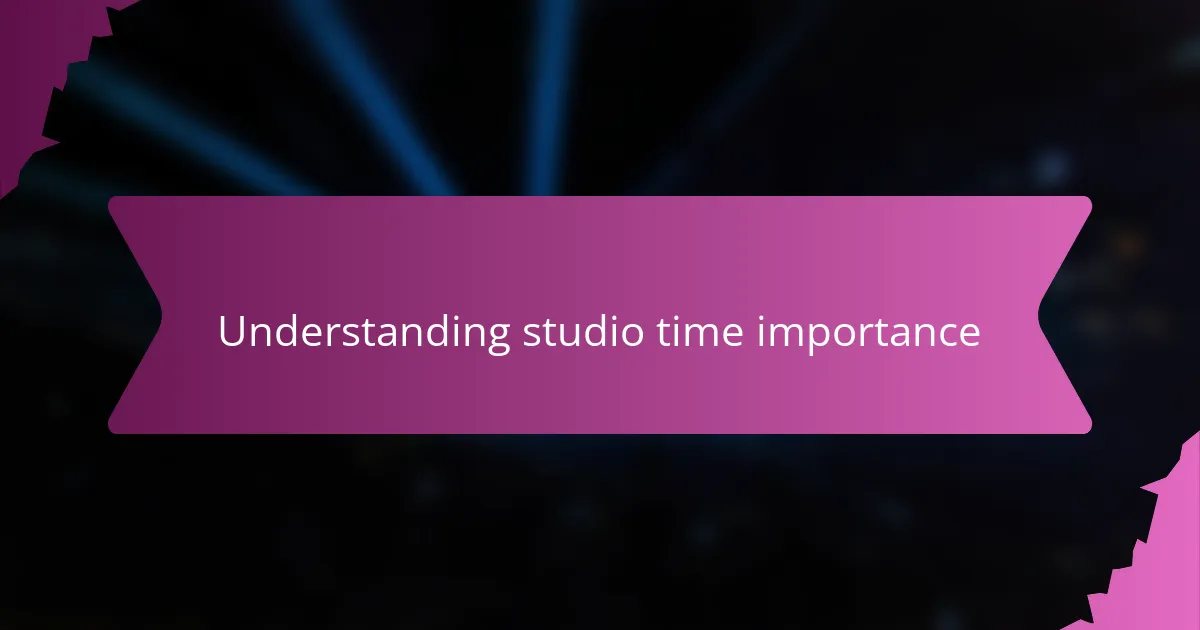
Understanding studio time importance
Studio time is more than just booking a room with equipment; it’s a dedicated space where creativity meets discipline. I’ve often found that the moments I reserve in the studio become my most focused and productive, free from distractions that usually cloud my at-home sessions. Can you imagine trying to capture your best performance without that focused environment?
There’s something almost sacred about stepping into a professional studio like Abbey Road. It’s a place where ideas transform into tangible soundscapes, and having that time scheduled means I respect the process and my own creative flow. When I first booked my session there, it was thrilling but also a reminder that time is limited—every minute counts.
Understanding the importance of studio time shifts how you approach your music projects entirely. It’s not just about having access to top gear; it’s about investing emotionally and mentally in those hours. I learned that treating studio sessions as valuable appointments helps me bring my best work forward, rather than rushing or procrastinating. Have you ever noticed how deadlines can fuel your creativity?
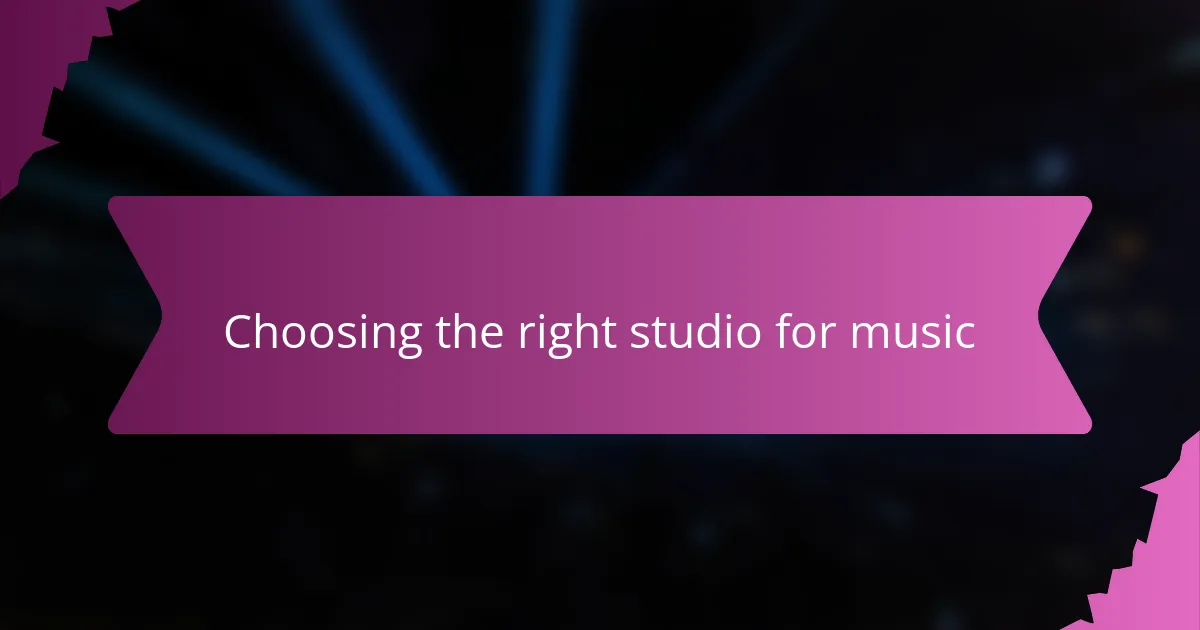
Choosing the right studio for music
Choosing the right studio feels like selecting a partner for your musical journey. I remember weighing options not just by equipment, but by the vibe and history a place exudes. Abbey Road, for instance, carries an aura that instantly sparks inspiration—don’t you think being surrounded by such legacy pushes you to raise your own bar?
For me, the decision boiled down to more than technical specs. I asked myself: Will this studio understand my creative needs? Will it make me feel comfortable enough to experiment? When I found a space that answered these questions with a warm yes, I knew I was in the right place.
Then there’s the practical side. I had to consider logistics like proximity, availability, and the support staff’s expertise. I once lost precious hours because a studio’s crew wasn’t aligned with my workflow, which taught me that booking the right studio means thinking both emotionally and strategically. Have you ever had a session where the environment either propelled or stalled your creativity?
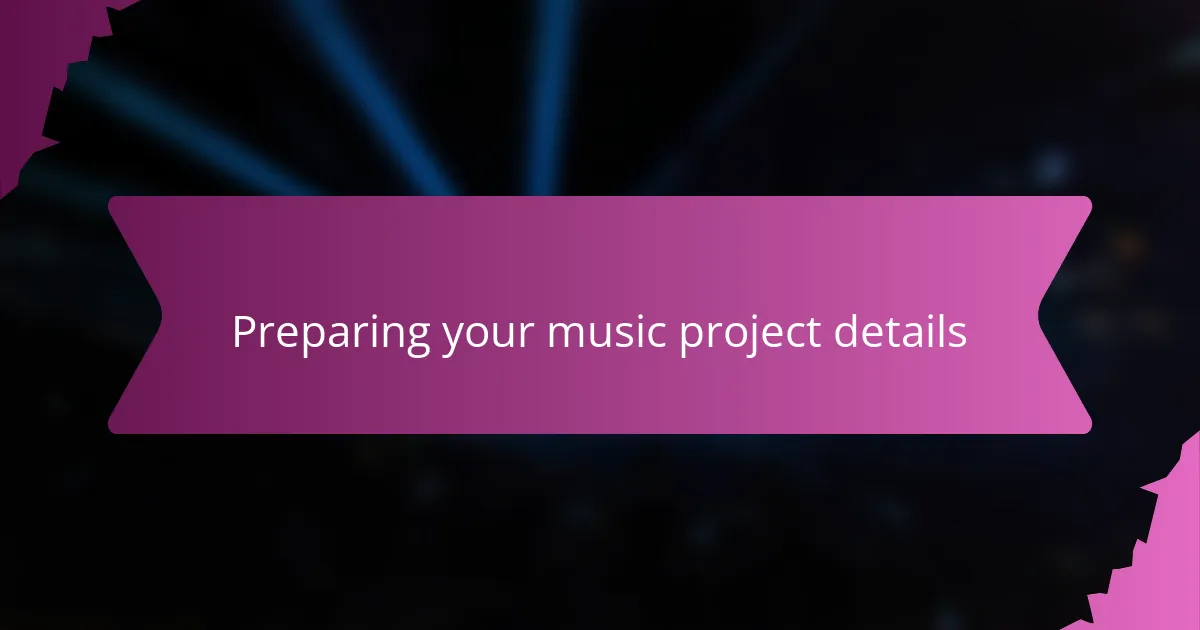
Preparing your music project details
Getting your music project details in order felt like laying down a solid foundation before building the house. I remember jotting down every idea, arrangement, and tempo change—I didn’t want to waste a single minute once inside Abbey Road. Doesn’t it make a huge difference knowing exactly what you want to achieve before hitting record?
I also made sure to organize my files and stems cleanly, so the engineer wouldn’t have to spend time searching through chaos. It was a small step, but it gave me extra confidence walking into the studio, knowing that technical hiccups wouldn’t slow me down. Have you ever experienced that frustration when a session derails because files aren’t ready?
Lastly, I took time to communicate my vision clearly—sharing references, moods, and key moments with the studio team. This openness turned into collaboration, sparking creative ideas I hadn’t thought of myself. It showed me that preparing project details isn’t just about logistics—it’s about inviting others to help bring your music to life. Would you agree that preparation makes the whole process feel more like a shared mission?
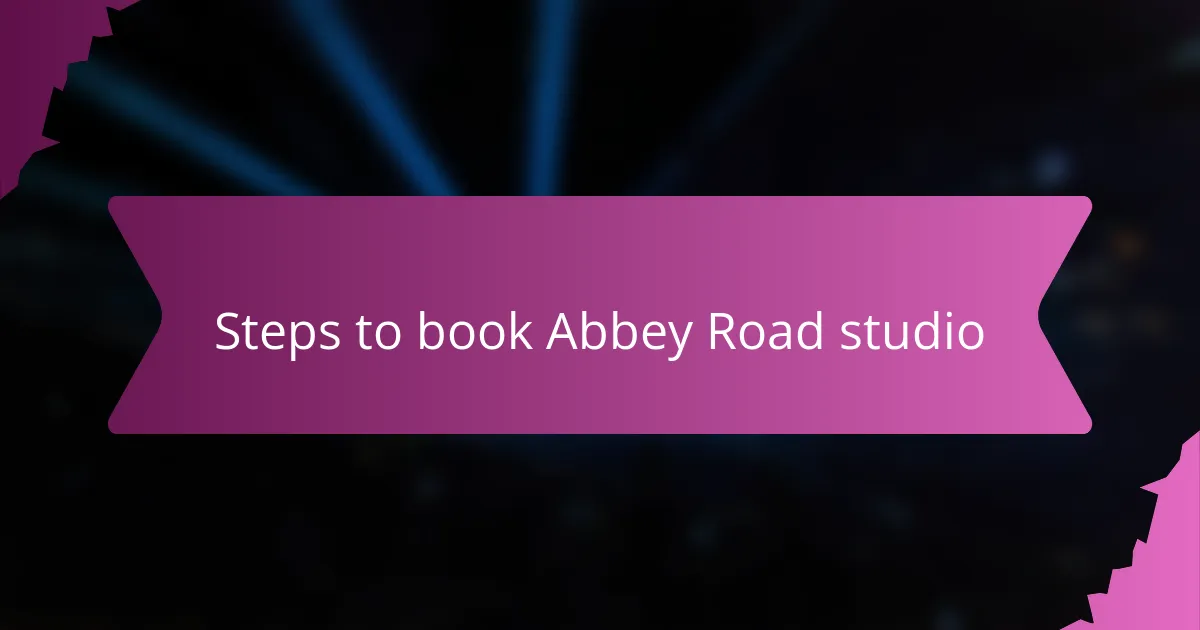
Steps to book Abbey Road studio
Booking studio time at Abbey Road started with visiting their official website, where I found all the necessary details laid out clearly. I remember feeling a bit nervous as I filled out the booking form, wondering if I’d chosen the right date and session length—making those initial choices felt like the first step in a big commitment. Have you ever hesitated over a decision because you knew the clock was ticking?
Next came the email exchange with their team, which was both reassuring and professional. They answered all my questions about availability, rates, and equipment options—this personal touch helped me feel confident that my needs were understood. When they confirmed my session, it was a thrilling moment; suddenly, the dream was real, and I knew I had to be prepared to make every second count.
Finally, I made sure to double-check all the details a few days before the session—like the start time, access instructions, and which rooms I’d be using. That little extra step gave me peace of mind and kept nerves at bay. Isn’t there something special about having everything organized so you can walk in with focus and excitement, not stress?
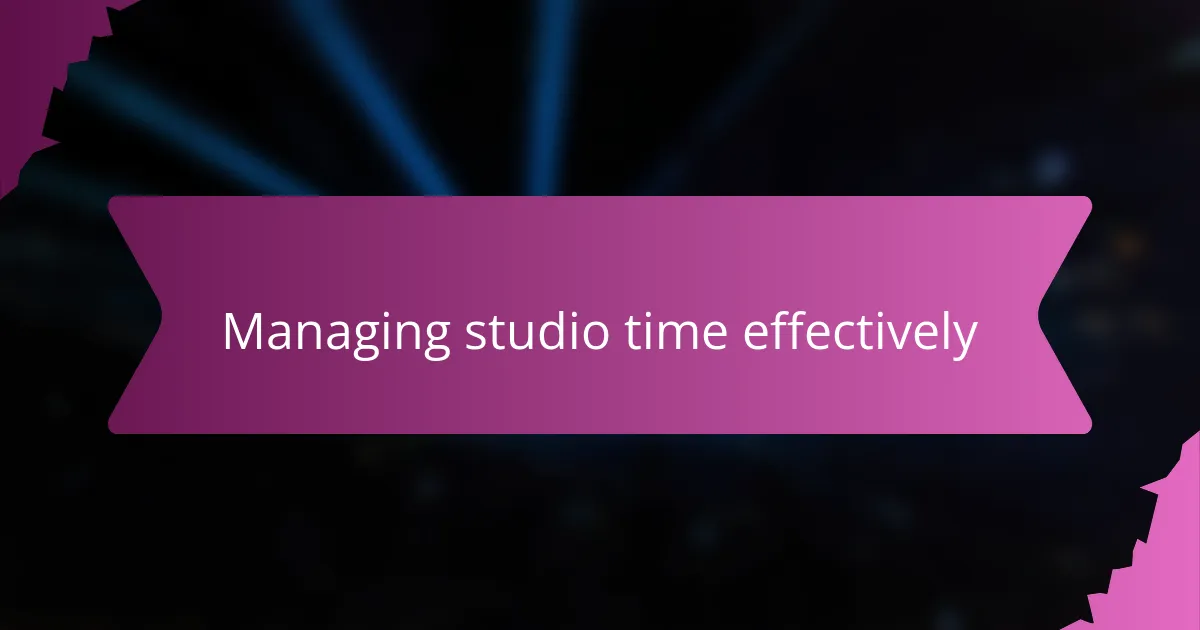
Managing studio time effectively
Managing studio time effectively means treating every minute in Abbey Road as a precious resource. I found that breaking down my session into clear segments—tracking, overdubs, mixing—helped me stay focused without feeling overwhelmed. Have you noticed how setting small goals keeps your creative energy sharp instead of scattered?
One thing I learned the hard way was to build in short breaks. At first, I thought nonstop work would maximize output, but fatigue actually dulled my judgment and performance. Stepping outside for a quick breath or chatting briefly with the engineer reset my mind and made the next takes better. Don’t you think fresh ears make all the difference?
Communication also proved crucial. Before starting, I made sure all team members knew the plan and my priorities. This way, whenever unexpected challenges popped up, we handled them smoothly without losing time. Have you ever experienced that flow state when everyone’s in sync? That’s the kind of rhythm managing your studio time strives to create.
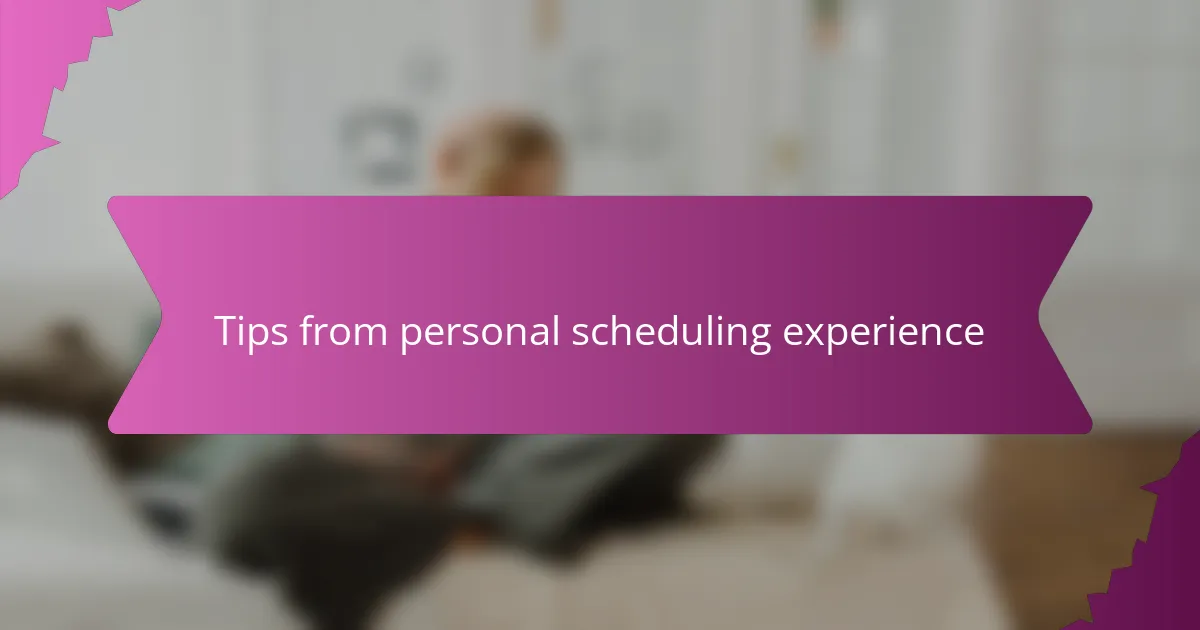
Tips from personal scheduling experience
One tip I’d emphasize from my experience is to block your studio time well in advance and treat it like a non-negotiable appointment. Early on, I underestimated how quickly slots fill up at Abbey Road, and scrambling last minute only added stress. Have you ever felt that pressure of racing against the clock? Reserving your session early gives you mental space to plan creatively rather than react frantically.
Another thing that helped me was building flexibility into my schedule. Even with meticulous prep, unexpected moments happen—maybe a breakthrough idea or a technical hiccup. Leaving buffer time meant I didn’t have to cut corners or rush when those surprises popped up. When I learned this, my sessions felt less like a race and more like a real creative journey.
Lastly, I found that reminding myself why I was there kept me focused and calm. Instead of seeing studio time as just a deadline, I approached it as a chance to capture something special. That shift in mindset made all the difference, turning pressure into motivation. Have you tried pausing to reconnect with your passion mid-session? It’s a simple trick that can recharge your energy and creativity on the spot.
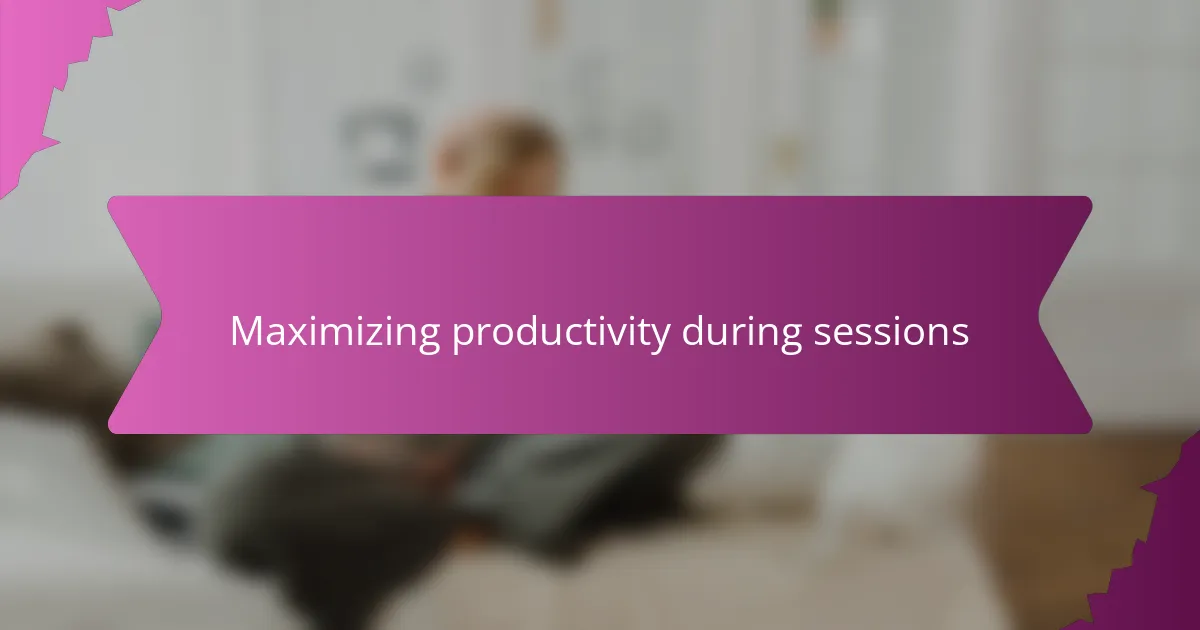
Maximizing productivity during sessions
When I step into a session at Abbey Road, I make sure to tackle the most challenging parts of my music first. It’s like clearing the hardest path while my energy is freshest, so the rest flows more naturally. Have you noticed how starting strong sets the tone for everything that follows?
I’ve also learned the value of keeping a detailed checklist during sessions. It’s easy to get lost in the excitement, but having clear markers keeps me on track and prevents me from revisiting the same ideas endlessly. Trust me, that structure transforms what could be a chaotic scramble into smooth, meaningful progress.
Sometimes, despite all the planning, things don’t go perfectly—and that’s okay. I make it a point to embrace those moments as creative detours rather than setbacks. It’s surprising how stepping back to reflect or shift gears can lead to breakthroughs I hadn’t expected. Have you found that patience and openness during sessions often unlock hidden potential?